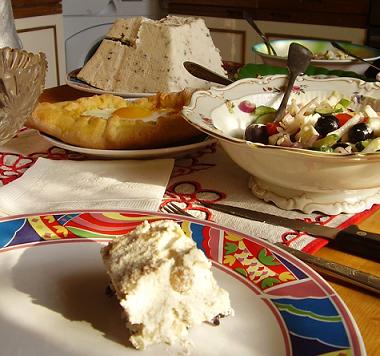Russian Easter: «Христос воскресе!» [Christ Is Risen!] Posted by josefina on Apr 19, 2009 in Culture, Traditions
Today is «Пасха» in Russia, thus Orthodox Easter. On this day it is traditional to eat not only lots and lots of eggs, but to treat your friends and family to this delicious desert also called «пасха», made mainly out of «творог» with nuts and raisins. (If you can’t see the picture here, you can see it on my personal blog here.) Its shape and color is supposed to remind of Christ’s tomb, out of which he was ressurected on this very day – «гроб христовий». It is super yummy, but also very sweet and thus you can’t eat more than a little slice at a time. But I bet those who’ve been on Orthodox lent – «Великий Пост» – for forty days before today won’t let their sweet-tooth be satisfied that easily…
In the Russian Orthodox Church the biggest holiday isn’t Christmas, but Easter – «Пасха», also known as «светлий праздник» [the light; bright; lucid; happy holiday] because it is followed by a week called «светлая неделя» [the bright week]. Unfortunaly Easter is still not an official red day in the calendar in the Russian Federation, but it is celebrated by many Russians, though not by all. It is traditional to greet people you know today with the words «Христос воскресе (воскрес)!» [Christ is risen!], to which they answer you «Воистину воскресе (воскрес)!» [Truly risen!] and you kiss each other on the cheek three times. Usually this greeting is accompanied by giving each other colored eggs (real eggs, not eggs made out of chocolate). You can also send out text messages from your phone with the same words to everyone you know, and within a couple of minutes you’ll get the very same answer from each and everyone of them. It is a very nice, kind and bright holiday in Russia, filled with hope and joy. It is my favorite Russian holiday, because it celebrates something really awesome – Jesus Christ winning over death and bringing us eternal life! I celebrated it at first during the day with my friend who came over with a «кулич» [special Easter cake] and had coffee with me, then in the evening by having dinner with my friend Katya and her sister Daria. Their mother is a «монахиня» [nun] and lives «в монастыре» [in a monastery] a few miles outside of Yekaterinburg. I celebrated Easter with this family two years ago, before their mother joined the monastery, and we went to the six hour long service in that same monastery that year. It was a great experience. This year Daria had invited over her close friend Zhenia, who’s a Catholic, since she knows I’m a protestant, and the whole evening became one long, deep, friendly and even beautiful discussion around the differences in each of our «вероисповедание» [faith; religion; creed; denomination]. Even though we have different points of view on many things, and do things differently, we all read one and the same Bible and believe in one and the same God, and on a day like this we can gather and agree on the main point – Jesus Christ’s «воскресение» resurection (not to be confused with «воскресенье» which means Sunday) from the dead.
«Со светлим праздником всех!»

Build vocabulary, practice pronunciation, and more with Transparent Language Online. Available anytime, anywhere, on any device.





Comments:
Susan LaVelle:
Twenty some years ago when I was first studying Russian, this information was hard for me to come by! Thanks!